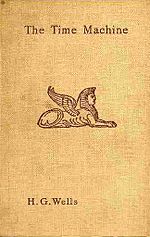Portal:Speculative fiction/Science fiction

Selected science fiction work
The Time Machine is a science fiction novel by H. G. Wells, first published in 1895 and later directly adapted into at least two feature films of the same name, as well as two television versions, and a large number of comic book adaptations. It indirectly inspired many more works of fiction in all media. This 32,000 word novella is generally credited with the popularization of the concept of time travel using a vehicle that allows an operator to travel purposefully and selectively. The term "time machine", coined by Wells, is now universally used to refer to such a vehicle. Wells introduces an early example of the Dying Earth subgenre as well.
Wells had considered the notion of time travel before, in an earlier (but less well-known) work titled The Chronic Argonauts. He had thought of using some of this material in a series of articles in the Pall Mall Gazette, until the publisher asked him if he could instead write a serial novel on the same theme; Wells readily agreed, and was paid £100 on its publication by Heinemann in 1895. The story was first published in serial form in the New Review through 1894 and 1895. The book is based on the Block Theory of the Universe, which is a notion that time is a fourth space dimension. The story reflects Wells's own socialist political views and the contemporary angst about industrial relations. Other science fiction works of the period, including Edward Bellamy's Looking Backward, and the later Metropolis, dealt with similar themes. Science fiction topicsRelated Portals |

